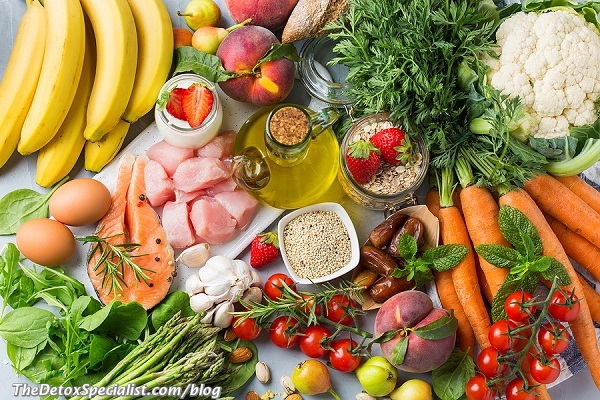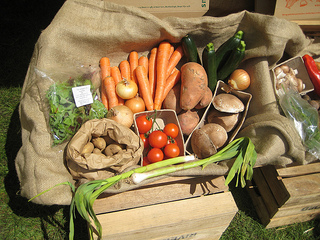
The debate between organic food vs non organic food has always been a burning issue among the consumers and nutritionists around the world but recent reports of soaring food bills makes the question of whether you should eat organic food for detox even more important.
People have become very concerned about the quality, nutritional values and toxic effects of different food ingredients available in the general stores or mega markets. I believe the case for organic food for detox is clear cut.
Organic food vs non organic food for detox:
Farming facts make the difference
Conventional farming involves the use of chemical fertilizers for influencing the growth in an artificial way. To be cost effective, they provide plants with the minimal ingredients needed to make the plant grow. Organic farming doesn’t allow use of traditional chemical ingredients. Instead organic farmers depend solely on natural composts and manures for assisting the natural growth of the crops.
According to soil experts the most important determinant of human health in farming is a healthy soil. Plants get their nutrition from a wide variety of minerals from the earth as well as from dead plants and tiny animals. A healthy soil contains worms, bacteria, fungi and insects which help to convert the raw ingredients in the soil to a form that the plants can use. Chemical fertilizers kill much of the life in the soil necessary for the health of the plant.
It stands to reason that the more minerals and other nutrients available in the soil the more nourishing it is for the plant and humans eating it so it is better to chose organic when you are following a detox diet plan.
Pesticides
Harmful pesticides and herbicides are used for managing insects and weeds in the conventional farms. On the other hand, organic farms utilize the scientific studies on beneficial flora and fauna. The organic farms use the beneficial insects for killing and deterring the harmful ones. The farmers rotate the crops and mulch to manage the weeds.
The Dirty Dozen
The Environmental Working Group (EWG) has conducted several scientific researches on consumer products available in the market. The objective of their study was to find out the extent of use of harmful chemicals in different foods. Their latest report found pesticide residue, including chemicals banned for use in agriculture, in 68% of the food they tested.
They have short-listed some of the dangerously chemical-exposed crops as well as the least exposed crops and produce an annual report.
Most exposed crops:
Apples, Peaches, Celery, Spinach, Cucumbers, Kale/Greens, Sweet bell peppers, Strawberries, Nectarines, Green beans, Grapes, Potatoes, and Blueberries. This list is also known as “The Dirty Dozen Plus”.
Least exposed (safer crops):
Onions, Avocado, Sweet Corn, Mangoes, Pineapples, Eggplant, Cabbage, Sweet potatoes, Sweet peas, Grapefruit, Asparagus, Mushrooms, Kiwi, Watermelon, and Cantaloupe. The list is also known as “The Clean 15”.
Organic food is expensive so if you cannot afford to buy all organically produced food when you detox it makes sense to at least avoid the Dirty Dozen.
To help, EWG have just released their newest shopping guide Good Food on a Tight Budget. This brand new shopping guide looks at 100 foods that are healthy, inexpensive, clean and green. More tips on Clever ways to eat healthy on a tight budget here. And even more tips from this article on How to eat Healthy on a Budget and this one on buying local.

Antibiotics and Growth Hormones
In traditional farms, experts recommend using animal antibiotics, growth hormones and biochemical medications to prevent diseases and influence growth. Organic farmers use organic animal feeds, natural nutrients (balanced meals) and outdoor growth concepts for enhancing growth and preventing diseases.
Scientists are voicing their concerns that antibiotic medicines are losing their effectiveness on humans due to their increased use in animal feed and that the use of artificial growth hormones pose a risk to our health.
Organic food vs non organic food: Why organic foods win the race
According to Harvard University nutrition experts, the USDA and The UK Food Standards Agency there is no difference between non-organic and organic food. But, according to the Soil Association, much more research is needed to fully understand the effects of the difference in nutrients in organically produced food and non-organically produced food. Few long-term research studies have been done as research into organic farming is under-funded internationally.
Antioxidant contradictions
We constantly hear contradictions from scientists. In 2010 Danish researchers claimed that polyphenol levels were the same in organic potatoes, carrots and onions as those grown with pesticides while this year (2012) researchers from the University of Barcelona found that organically grown tomatoes contained higher levels of polyphenols than tomatoes grown with pesticides.
Polyphenols are natural plant antioxidants that have been associated with reduced risk of heart disease, cancer and other degenerative diseases. The Danish study has been criticized because the foods they conducted the research on are not the first that spring to mind when taking about food antioxidants.
A new study of corn, strawberries and marionberries (a type of blackberry) showed that organically grown vegetables and fruit contained significantly higher levels of cancer-fighting antioxidants than conventionally grown foods. The research suggests that pesticides and herbicides actually prevent the production of phenolics — natural antioxidant chemicals that act as a plant’s natural defense and also happen to be good for our health and an important part of the detox process.
More minerals for detox
A 12-year German study found that organic food contains higher levels of minerals. The largest differences were for potassium and iron, but magnesium, calcium, phosphorus and vitamin C levels were also higher in organic vegetables. These minerals are vital for your body’s detox system.
Organic foods are clearly more hygienic and harmless than conventionally farmed crops. Use of pesticides, food additives, chemical growth enhancers, synthesized hormones contributes lower health-safety margins in crops of traditional farms.
One study which reviewed 150 research projects comparing organic and non-organic food confirmed that, despite varied research methods, there is a trend towards fewer undesirable components or contaminants, and higher desirable components, such as vitamins and minerals in organic food compared with non-organic food.
The aim of a detox diet is to reduce the chemical toxins in the body so it’s important not to add to the toxic load. Your health is vulnerable and more important so I believe that the question of organic food vs non organic food for detox is quite clear. Make your budget short in other products, but don’t compromise your health.




Thanks for the article.
Most people should be choosing organics fruits, vegetables and meats wherever practical due to the benefits they provide.
Maybe just my opinion, but natural is almost always better!
Hi James,
You are not alone in your opinion. Many others agree. U.S. sales of organic food and beverages have grown from $1 billion in 1990 to $26.7 billion in 2010.That tells you something!
Good health
Sandy
This should be obvious that if you want to avoid the pesticides, additives, etc. then you need to choose organic foods. I honestly don’t understand why more people don’t seem to realize this.
This should be apparent that if you want to prevent the bug sprays, preservatives, etc. then you need to select natural meals. I genuinely do not comprehend why more individuals do not seem to recognize this.
Non-organic foods like dried fruits, raw nuts and seeds, fresh vegetables are always recommended for detoxification purposes. Other than these fruits, there are many other items that are considered to be very important for your body. These foods have a high level of water content and minerals in them. It is believed that they help in maintaining the balance of water, electrolytes and hormones of the body. These are the essential elements that are required for our body to function properly and in a proper manner. So if you want to stay healthy and fit then you should definitely include these foods in your daily diet. Non-organic foods can actually increase more problems rather than provide any benefits at all. These junk foods are high in fat, sugar, cholesterol and chemicals. They are not at all good for your body. Hence switching over to these foods can definitely improve the health of your body.
I think you meant to say organic foods Mike! What you say about organic food is so very true. The problem is that for many people organic food is just too expensive to eat all the time and there’s not always the variety available depending on where you live. I find that local farmer’s markets can be good. Even though their produce may not be certified organic they do not in fact use chemicals when growing their produce. Always good to ask if that is so.
Good health.
Sandy
Holistic Nutritionist & Health Coach